Introduction
“I am just trying to figure out who I am.”
“I just don’t know who I am anymore.”
“I don’t like the person that I have become.”
These are common self-analysis questions we ask ourselves. Many also wonder how others perceive them. However, the real question is: Who are you?
People use various aspects to define themselves, such as:
- Cultural background, ethnicity, and religion
- Personality traits
- Horoscope
- Belief systems
- Moral code, likes, and dislikes
But do these factors truly describe who we are—especially as born-again believers?
Identity Crisis
Major life changes or expectations can lead to confusion or uncertainty about one’s identity. Examples include:
- Questioning cultural beliefs and values
- Attempting to change personalities
- Questioning life’s purpose and role
- Experiencing social isolation, anxiety, and depression

In this module, you will discover your identity, particularly who you are in Christ.
The First Man/First Adam
In the beginning, God created the first man, Adam.
Scriptural Reference
- Genesis 1:26: “And God said, Let Us make man in our image, after our likeness.”
In this scripture, God the Father, God the Son, and God the Holy Spirit decided to make mankind.
The word ‘image’ (Greek = homoiosis) means resemblance or similitude.
So, God said: “Let Us make man after our own similitude” – meaning God the Father, the Son, and the Holy Spirit.
God used three elements to make mankind in His triune image:
Scriptural Reference
- Genesis 2:7: “And the LORD God formed man of the dust of the ground, and breathed into his nostrils the breath of life; and man became a living soul.”
These three elements represent the triune God:
- Dust of the ground – Body – God the Son
- Breath of life – Spirit – God the Holy Spirit
- Living soul – Soul – God the Father
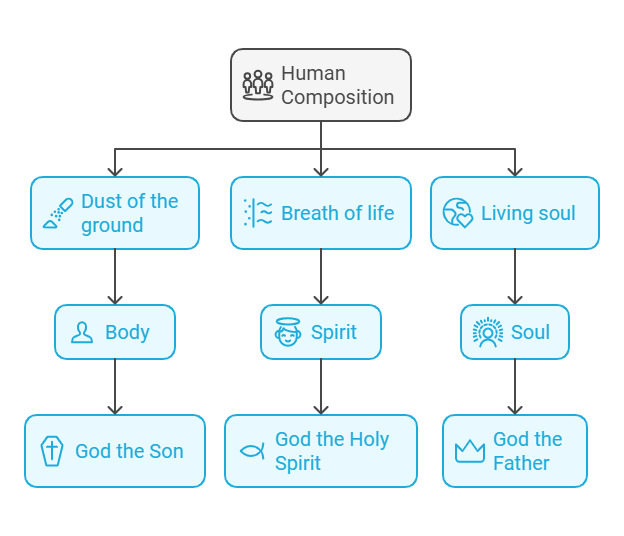
Every person is created as body, soul, and spirit. You are a spirit being living in a body and governed by your soul. Let’s examine these three elements in detail:
I. The Body
The body is the physical flesh, including the head, arms, legs, and so forth. It is what science and human anatomy study. The body correlates with God the Son.
Scriptural References
- John 1:1: “In the beginning was the Word, and the Word was with God, and the Word was God.”
- John 1:14: “And the Word was made flesh, and dwelt among us.”
The body is mortal and disintegrates into dust upon death.
II. The Soul
The soul is the consciousness or essence of a person, comprising the mind, will, intellect, and emotions. It governs decision-making and correlates with God the Father.
Scriptural Reference
- Matthew 22:37: “Jesus said unto him, Thou shalt love the Lord thy God with all thy heart, and with all thy soul, and with all thy mind.”
III. The Spirit
The spirit is the moral compass and conscience of a person. It corresponds with the Holy Spirit and guides our lives.
Scriptural References
- Job 32:8: “But there is a spirit in man: and the inspiration of the Almighty giveth them understanding.”
- Job 33:4: “The Spirit of God has made me, and the breath of the Almighty has given me life.”
- Proverbs 20:27: “The spirit of man is the lamp of the LORD, Searching and examining all the innermost parts of his being.”
Due to the fall of man, the spirit of man became inactive until the coming of Christ.
Scriptural Reference
- Genesis 2:17: “But of the tree of the knowledge of good and evil, you shall not eat, for in the day that you eat of it, you shall surely die.”
This death was not physical but spiritual.
The Fall of the First Adam
Adam and Eve disobeyed God and ate the forbidden fruit after being deceived by Satan.
Scriptural Reference
- Genesis 3:6: “When the woman saw that the tree was good for food… she took of its fruit and ate, and she also gave some to her husband, and he ate.”
This act of disobedience was the integration of sin into mankind. Hence, because of one man’s (Adam’s) sin, all humanity inherited his sinful nature.
Scriptural Reference
- Romans 5:12: “Wherefore, as by one man sin entered into the world, and death by sin; so death passed upon all men, for that all have sinned.”
This fall introduced sin into humanity, making salvation through Christ necessary.
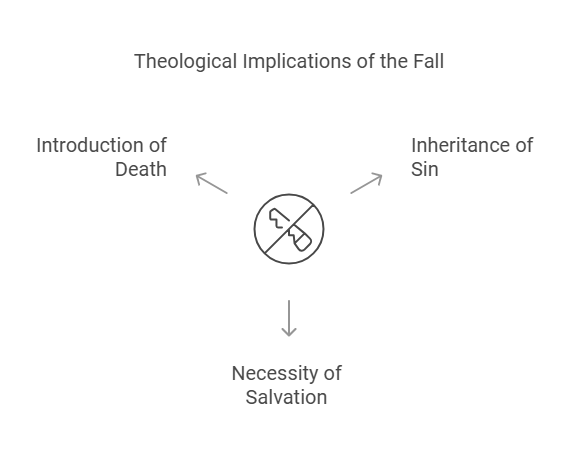
The Last Adam/Jesus Christ
The primary reason for Christ’s coming was to save mankind from sin. That is what salvation means – deliverance of mankind from sin.
Scriptural Reference
- 1 Corinthians 15:45: “The first Adam was made a living soul; the last Adam was made a quickening spirit.”
Through salvation, a person’s spirit is regenerated through Christ (quickening spirit – means life giving spirit).
Unlike the first Adam who was a living soul being controlled by their soul; the last Adam is a life giving spirit.
When a person accepts the Lordship of Jesus Christ, they receive a new life. This new life is given in the spirit.
Hence, the new birth (being born again) concerns the regeneration of the spirit, which was rendered inactive (dead) when Adam sinned against God.
Scriptural References
- John 3:3: “Except a man be born again, he cannot see the kingdom of God.”
- 2 Corinthians 5:17: “Therefore if any man be in Christ, he is a new creature: old things are passed away; behold, all things are become new.”
The new birth is, therefore, the regeneration of your spirit. Before salvation, you were considered a fallen man – carnal man. You were controlled by your soul.
But now that you are saved, you are a spirit man. You have received a new life in Christ Jesus – you are controlled by the Spirit.
Scriptural reference
- Galatians 5:16: “This I say then, walk in the Spirit, and ye shall not fulfill the lust of the flesh.”
The New Creation
Now that you have received a new life, you need to understand that your identity is changed.
New creation implies you are reconciled to God through Christ.
Scriptural references
- 2 Corinthians 5:17: “Therefore if any man be in Christ, he is a new creature: old things are passed away; behold, all things are become new.”
- 2 Corinthians 5:18: “And all things are of God, who has reconciled us to himself by Jesus Christ, and has given to us the ministry of reconciliation.”

As a new creation in Christ, your old nature is gone. This includes:
- Past addictions and habits
- Ungodly relationships
- Moral corruption
- Personal fears and insecurities
Scriptural References
- Romans 8:1-2: “There is therefore now no condemnation to them which are in Christ Jesus…”
You are free from sin and death, but this freedom requires transformation and righteousness by faith.
As a new creation, your inheritance or nature is twofold;
- The mind of Christ – results in transformation of the mind
- The faith of Christ – results in righteousness
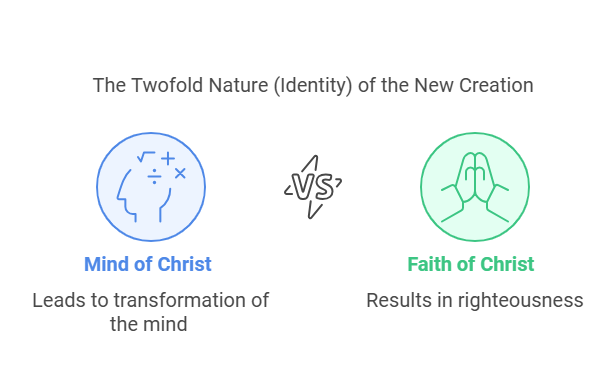
1. The Mind of Christ – Transformation
As a new creation, your mind (thought patterns) must be renewed from carnality to align with Christ.
Scriptural References
- Romans 12:2: “Be transformed by the renewing of your mind…”
When you were not born again, your thought process was shaped and influenced by the patterns of this world. For example, you may have relied on science and research to guide your decisions. Perhaps you turned to horoscopes or palm readers for direction. Others built their worldviews on empty philosophies and human wisdom. But now, as a new creation in Christ, your mindset must be renewed and reprogrammed to align with the mind of Christ.
Transformation occurs when the Word of God shapes your thinking daily.
Scriptura reference
- Colossians 3:10: “And have put on the new man, which is renewed in knowledge after the image of him that created him.”
2. Righteousness of God by Faith
Righteousness is imparted by faith, not works. Mankind cannot keep the law by their own works or efforts
Scriptural References
- Romans 3:20: “By the deeds of the law, no flesh will be justified…”
Hence, Jesus warned that we should not pride ourselves in keeping the law like the Pharisees.
Scriptural reference
- Mathew 5:20: “For I tell you, unless your righteousness exceeds that of the scribes and Pharisees, you will never enter the kingdom of heaven.”
People fear salvation because they are deceived that you have to keep the laws given to Moses for you to be righteous.
That ideation is a misconception. Jesus confirmed this by saying that he is the fulfilment of the law.
Scriptural reference
- Mathew 5:17: “Do not think that I have come to abolish the law or the prophets: I have not come to abolish them but to fulfil them.”
- Romans 10:4: “For Christ is the end of the law for righteousness to everyone who believes.”
People who attempt to achieve righteousness through their own efforts unknowingly reject the Lordship of Jesus Christ. Simply put, righteousness cannot be earned through works, traditions, or religious practices such as attending church, giving to the church, adhering to dress codes, using anointing oils, partaking in the Lord’s Table, fervent prayers, or helping the needy.
Do not misunderstand—these practices are valuable and important in the life of a believer. However, they cannot make you righteous in God’s eyes. Righteousness is a gift that can only be received through faith. In His infinite wisdom, God designed this as the only way to deliver and redeem humanity from sin.
Scriptural Reference
- 2 Corinthians 5:21: “For he made Him who knew no sin to be sin for us…”
The Significance of Righteousness by Faith
What Is Faith?
Faith is the confident hope we have in something not yet visible in the physical world.
Scriptural Reference:
- Hebrews 11:1: “Now faith is the substance of things hoped for, the evidence of things not seen.”
Faith is imparted to us—it is given or assigned. When you were born again, you received the faith of Christ.
Scriptural Reference:
- Romans 12:3: “Think with sober judgment, each according to the measure of faith that God has assigned.”
Now that you have been given the same measure of faith as Jesus Christ, you need to exercise it to fully experience the righteousness of God.
Scriptural Reference:
- Romans 12:3: “Instead, honestly assess your worth by using your God-given faith as the standard of measurement, and then you will see your true value with an appropriate self-esteem.”
Your true value is measured by the faith of Jesus Christ.
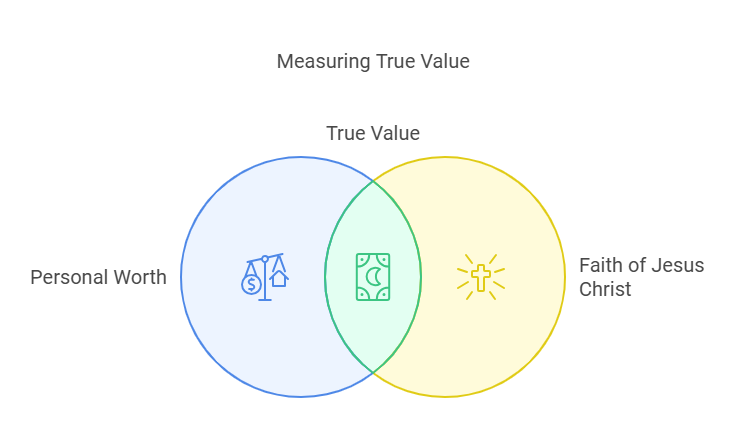
Key Practices of Righteousness
- Embrace Your Identity in Christ
- Assure your mind of who you have become in Christ by continually reminding yourself of His work on the cross for your salvation.
- Though He was sinless, He became sin so that you could become the righteousness of God. This righteousness is your true value and the source of your self-esteem.
- Reject Negative Labels
- Never allow anyone to label you as weak, poor, broken, toxic, or useless. Reject these ideations because you are the righteousness of God.
- Forget Past Transgressions
- Do not dwell on your past sins or feel remorseful over them. They have been forgiven.
- Handle Mistakes with Grace
- When you fall, remember that God does not deal with you according to your weaknesses. Approach Him boldly in prayer, free of condemnation. God does not guilt-trip you when you sin.
- Be Angry at Sin
- Refuse to let sin have dominion over you. Your past addictions and mistakes no longer define who you are.
- Access God Anytime
- The righteousness of God gives you unlimited access to Him. God is never far away, and in your moments of weakness, He manifests His strength in you—for when you are weak, He makes you strong.
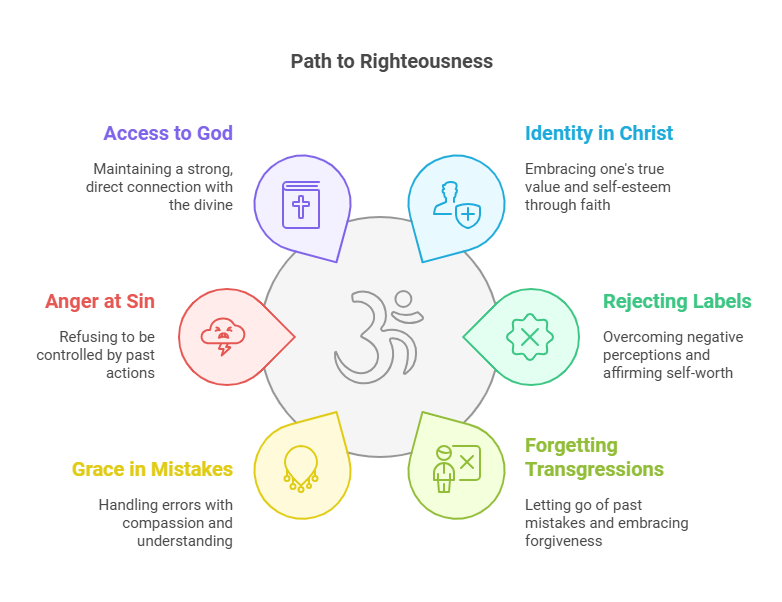
Digest Questions
- What defines my character?
Your character should not be defined by human wisdom or opinions but by the Word of God. You are created in God’s image and likeness. Do not let emotions, feelings, weaknesses, or mistakes control you. Instead, allow the Spirit of God within you to shape your character. - What is our true identity?
As New Testament believers, our true identity is in Christ—not in human philosophies, cultural norms, or political affiliations. - What does it mean to “find myself”?
Finding yourself means understanding who you are through the Word of God. This involves spending time reading scripture, praying, and fellowshipping. As you seek God, He reveals who you are and what Christ accomplished for you on the cross. - What does it mean to find your identity in Christ?
Finding your identity in Christ means recognizing that, through salvation, you have received a new identity. You are no longer bound to sin and evil but have been given a new, sin-free life. - What does the Bible say about identity in Christ?
The Bible calls you a new creation. Your old self is gone, and your spirit has been regenerated by the Holy Spirit. You are now reconciled to God. You are the righteousness of God by faith. - How can one be certain of their identity?
Certainty in your identity comes through the transformation and renewal of your mind. You become confident when you think and act in alignment with scripture, demonstrating the mind of Christ. - How can one deal with insecurity?
Your true value, purpose, and self-esteem are rooted in your faith. Since you are in Christ, you share His faith and righteousness. Your worth is measured by God’s standard, not by human opinions or comparisons. You don’t need to compare yourself to anyone.
